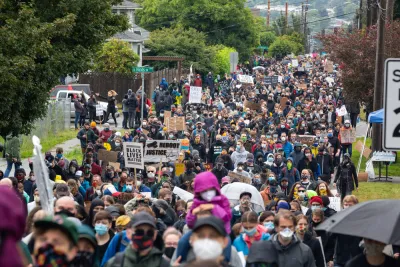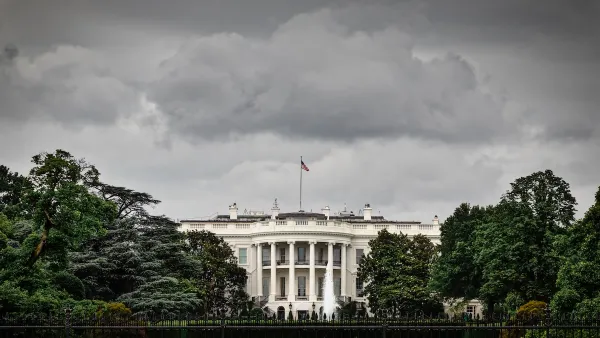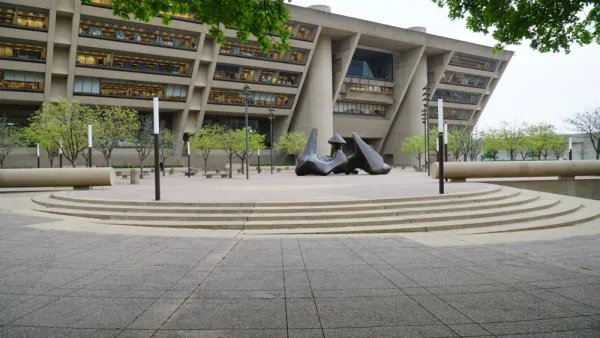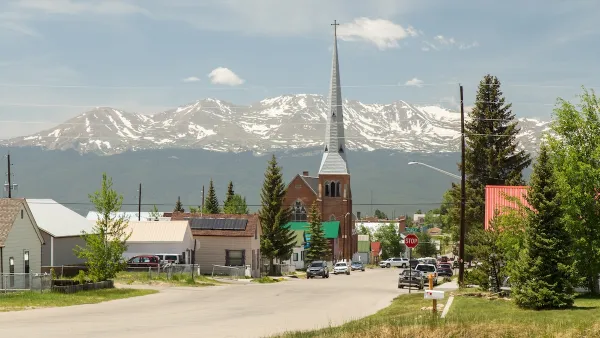Equity is a fine value—but on contentious land use issues, equity can be used to support either side of the argument.

“We need to prioritize equity.” So I heard in a webinar today. This view seems pretty inoffensive; after all, who says “I’m against equity”?
But I have (at least) one concern, which is this: it seems to me in urban planning-related arguments, almost any possible position can be defended on equity grounds.* Below is a few scenarios that show what I mean:
Option 1: Landowner wants to rezone to build heavy industry in poor neighborhood.
Pro: Equity demands that we bring low-skill jobs to people who desperately need them, and bring back the good old days of heavy industry!
Con: Equity demands that we protect the poor from the death and disease caused by polluting industry!
Option 2: Landowner wants to rezone to build restaurants and a hotel.
Pro: Equity demands that we bring jobs to poor neighborhoods, instead of having job sprawl that brings jobs to the suburbs where poor people without cars cannot reach them!
Con: Equity demands that we keep out land uses that will attract non-poor people and create gentrification! The only jobs that belong in a poor neighborhood are ones that will make the neighborhood as unattractive as possible to nonpoor people!
Option 3: Landowner wants to rezone to build new market-rate housing in poor neighborhood.
Pro: Equity demands that we increase housing supply to reduce housing costs!
Con: Equity demands that we keep out any housing that isn’t 100 percent affordable, because otherwise there will be gentrification!
Option 4: City councilman responds to failure of Options 1-3 by proposing that landowners who wish to build anything at all in low-income neighborhoods spend time and money paying off local activists and filling out impact statements, in order to protect the poor from the risk of pollution and gentrification.
Pro: Equity demands that we protect the poor from pollution and gentrification!
Con: Equity demands that we make it as easy as possible to develop in poor urban neighborhoods, instead of making it easier to develop in suburbs with no public transit!
Option 5: Landowner gets paid by city to build 100 percent housing that is affordable to persons earning 60 percent of area median income.
Pro: Equity demands more affordable housing!
Con: Equity demands that affordable housing be for truly poor people, not for people who are middle-class!
Option 6: After controversy over Option 5, city proposes to build homeless shelter in poor neighborhood.
Pro: Equity demands more affordable housing, especially for the poorest, weakest and most helpless among us!
Con: Equity demands that our neighborhood should not be a dumping ground for drug addicts. Build these horrible things in a rich neighborhood instead!
Option 7: After controversy over Option 6, city proposes to build homeless shelter in rich neighborhood instead.
Pro—Equity demands that poverty be spread all over the city, not just concentrated in a few neighborhoods!
Con—Equity demands that if suburbanites can avoid having the homeless in their neighborhoods, we should be able to avoid it too- otherwise we're being penalized for living in the city! And if you build the shelter we are all moving to the suburbs, and then you will have no tax base, which will make everything even more inequitable as the city becomes a poverty-packed ghetto, and we gorge ourselves on the wonderful public services of suburbia!
As those of you who have read my Planetizen posts know, I have opinions about some of these arguments—but my opinions are based not just on my views about equity, but on my opinions on quite a few other issues. Someone who supports suburban sprawl is likely to have very different views about the options above than someone who favors smart growth; someone who believes that markets can increase housing affordability is likely to have very different views than someone who trusts government to come up with the money to house most Americans.
*I note that, at least in an ethnically diverse city, these issues often have a racial component as well. But that is a more complex and emotional discussion.

Analysis: Cybertruck Fatality Rate Far Exceeds That of Ford Pinto
The Tesla Cybertruck was recalled seven times last year.

National Parks Layoffs Will Cause Communities to Lose Billions
Thousands of essential park workers were laid off this week, just before the busy spring break season.

Retro-silient?: America’s First “Eco-burb,” The Woodlands Turns 50
A master-planned community north of Houston offers lessons on green infrastructure and resilient design, but falls short of its founder’s lofty affordability and walkability goals.

Test News Post 1
This is a summary

Analysis: Cybertruck Fatality Rate Far Exceeds That of Ford Pinto
The Tesla Cybertruck was recalled seven times last year.

Test News Headline 46
Test for the image on the front page.
Urban Design for Planners 1: Software Tools
This six-course series explores essential urban design concepts using open source software and equips planners with the tools they need to participate fully in the urban design process.
Planning for Universal Design
Learn the tools for implementing Universal Design in planning regulations.
EMC Planning Group, Inc.
Planetizen
Planetizen
Mpact (formerly Rail~Volution)
Great Falls Development Authority, Inc.
HUDs Office of Policy Development and Research
NYU Wagner Graduate School of Public Service





























